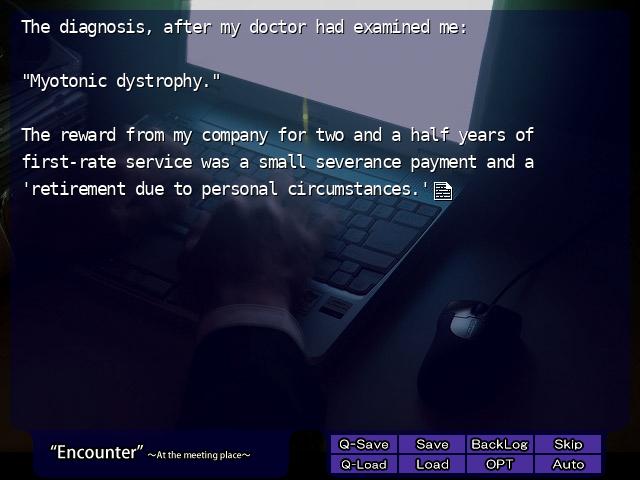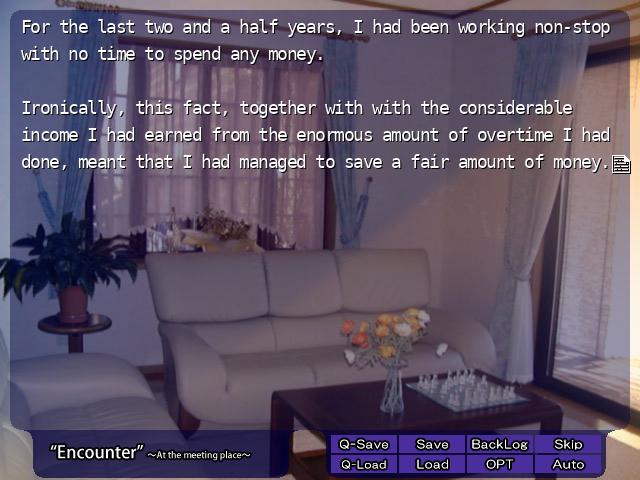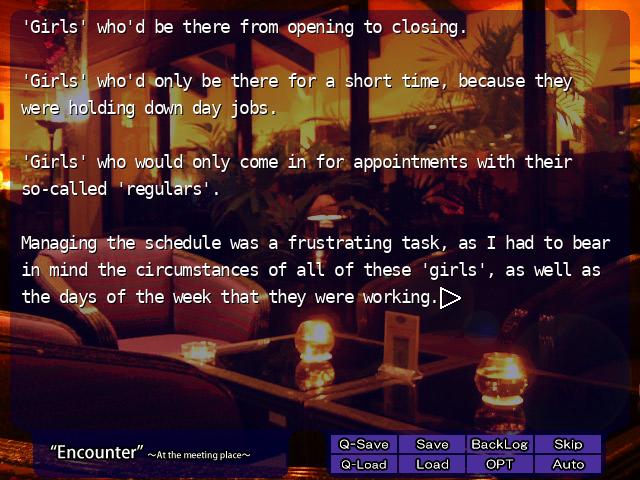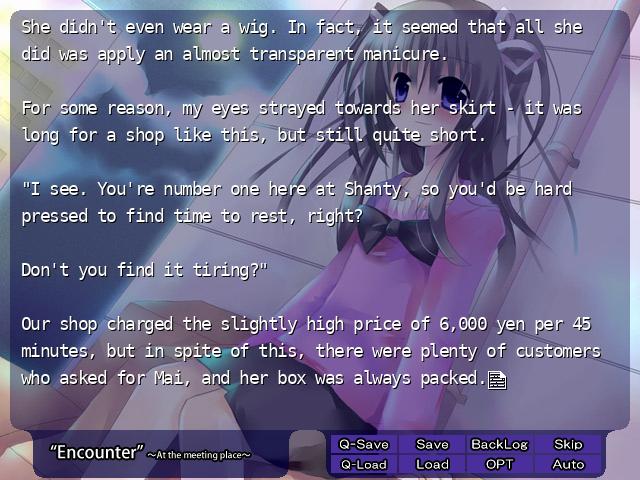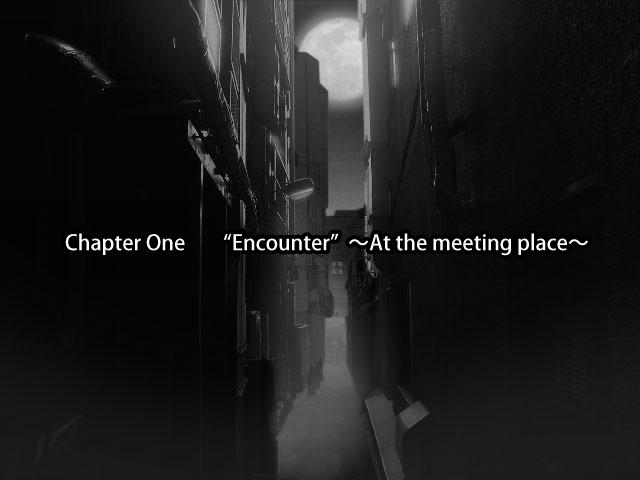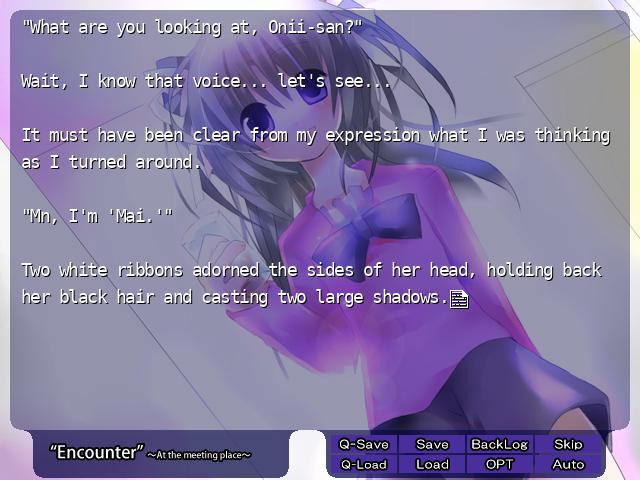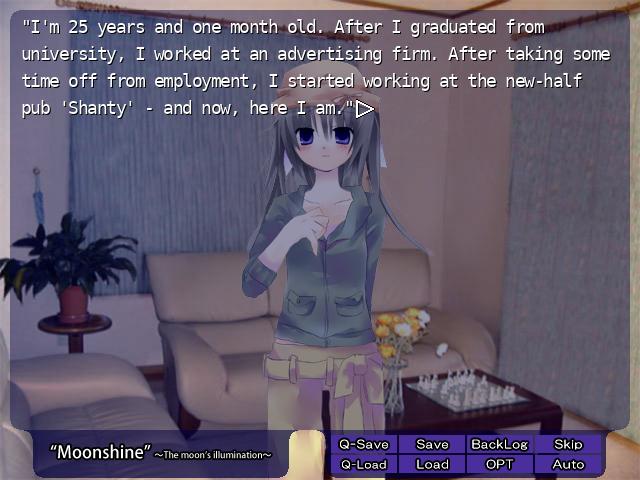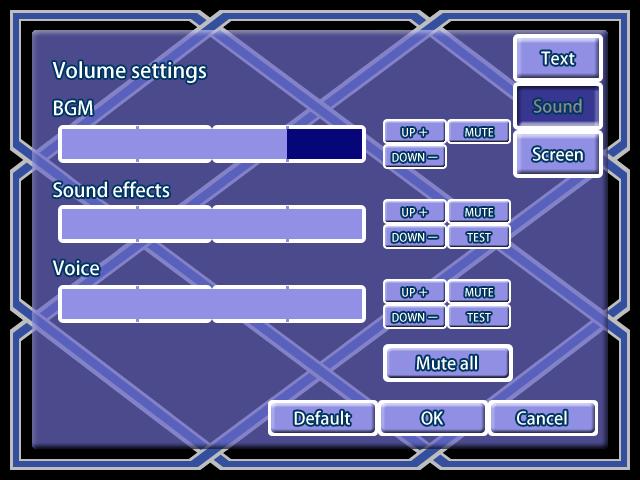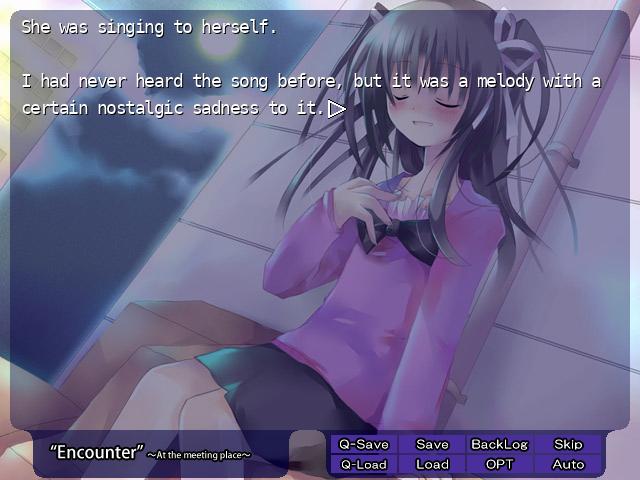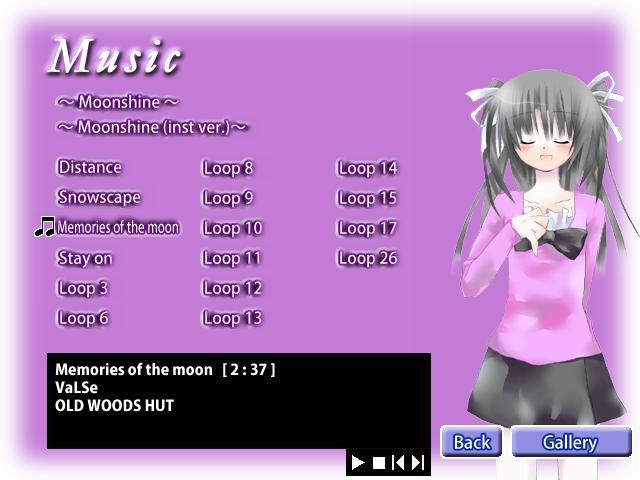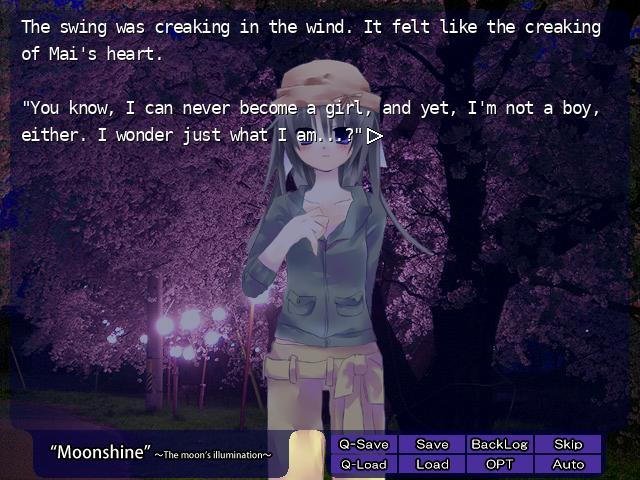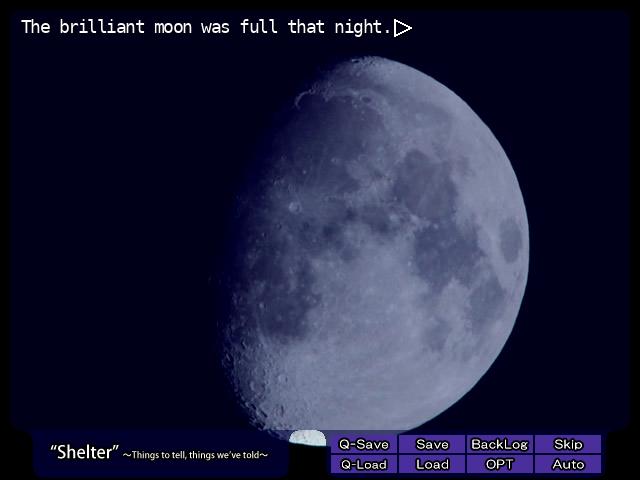Moonshine is the 2008 translation of a 2007 Japanese doujin freeware visual novel called Tsuki no Terasu. The original novel was created by circle Sakura Mint. The translation was completed by AstCd2 for Insani and submitted to the final al|together visual novel translation festival in 2008. Although the original Moonshine which was translated for al|together 2008 was free, it received two subsequent hard copy commercial releases in Japan.
You can learn more about my al|together project by reading my project introduction article. That article includes a running list of our completed al|together reviews. I have a dedicated collection post with links to all of our al|together articles, including reviews, essays, and short posts.
The first point usually mentioned in pieces about Moonshine concerns its heroine, Mai – who is the only character in any of the 31 al|together pieces to have gender identity issues. Mai is male, but lives and presents as a woman and works at a hostess bar with other similarly situated hostesses.
The Insani literature on the project notes that gender identity was an unusual topic to be handled, especially seriously, in a Japanese doujin visual novel in 2007. In terms of production values, Moonshine is one of the few al|together pieces to have voice acting (only for Mai) and it presents unusually solid production values by the standards of the pieces we have been reviewing. However, while Moonshine has some distinguishing marks – it is familiar in other ways, especially among the 2008 set of translations. Both its protagonist, an unnamed 24-year old man, and the 20-year old Mai, struggle, for different reasons, to find a home in modern Japan set in the then-present. Despite their many differences, they both find themselves in the same place, and it is because of that coincidence that they come to get to know each other, interact, and look for a place where they belong.
Moonshine Details
2008 English version:
| Title | Moonshine |
|---|---|
| Translator | AstCd2 (Insani) |
| Release Date | November 30, 2008 |
| Engine | ONScripter-EN |
| Official Website | altogether 2008 |
Note: I recommend reading the essays on the al|together 2008 site for Moonshine but strongly advise that anyone who intends to read through the novel does so before reading “The Analysis” section since that spoils major points of Moonshine’s story.
2007 original Japanese release
| Title | Tsuki no Terasu |
|---|---|
| Creator | Sakura Mint (circle) |
| Release Date | July 31, 2007 |
| Engine | NScripter |
| Website | Archived; Official download |
As I noted in the introduction, Moonshine received a couple of physical re-releases. I do not know how or if these versions differed from the original release that was translated for al|together.
Downloading and Installing Moonshine
Moonshine remains readily available on Insani’s website for Windows and MacOS, although the MacOS version will most likely not work on modern Mac devices. I downloaded the Windows executable, extracted its contents, and ran the novel with Galladite’s June 2023 Linux build of ONScripter-EN. The novel ran without issue save for some background artifacts in a brief epilogue that occurs after the end credits (cause unknown at this time). I was also able to install and successfully test the original Windows release of Moonshine on top of WINE with no apparent problems.
General Overview
The view-point character in Moonshine is a 24-year old man who had been holding down a white collar job with long hours. He lost the job when he began to struggle with muscular dystrophy and found that his employer was unwilling to accommodate him.
The viewpoint character goes through a period of unemployment, relaxing with books, before determining that he needed a job to replenish his now depleted funds.
The protagonist ends up taking a job at a hostess club populated by “girls.” By “girls,” which he puts in quotation marks, he means that the “girls” are all males who are presenting as female. He notes that some had undergone surgeries, others used cross-sex hormones, and more still dressed in women’s clothing without any surgical or chemical intervention.
Mai, whom he befriends, falls into the final camp.
(Note: The protagonist’s job at the club seems to involve setting up for opening, helping to close, and other clerical tasks. He is not one of the hostesses.)
Mai works at the club and, despite not having undergone surgery or used cross-sex hormones, is distinctly feminine in appearance and manner and is apparently the most popular hostess at the club.
Mai and the protagonist grow close over time as they chat after work.One day, Mai asks the protagonist out on the weekend in what is, by all appearances, a date. It is on this date where the story opens up, and Mai and the protagonist go from enjoying each other’s company but knowing very little about each other to getting to know each other and the reasons why they both happened to end up at that particular hostess club at the same time. We learn why the pair feel a sense of not quite belonging anywhere and why they are unsure of how they want to move forward in their lives. The protagonist reveals his reasons, and while some of Mai’s reasons are obvious on the surface others are not .. The precise parameters are beyond the scope of our generally spoiler-free review.
Moonshine Review
Below, I review Moonshine in all of its components.
Estimated reading time
Visual Novel Database gave Moonshine a 72-minute estimate based on 12 votes, and I think that is right, give or take 10-15 minutes depending on reading speed. Moonshine errs on the long-side by al|together standards and it is not the sort of text that one can merely skim to understand. I will note that the latter half of the story ended up feeling a little bit longer than I expected while reading.
Game-play and structure
Moonshine is an entirely kinetic visual novel with no choices. Structurally, it is broken into many chapters, each chapter separated with a title and simple visual card.
Sakura Mint implemented a nice and unique touch with chapters. In most chapter-based al|together novels such as Red Shift and A Midsummer Day’s Resonance, the novel notes when a new chapter begins with a chapter card but then no longer features the chapter info. Conversely, in Moonshine, the name of the chapter is always on screen in a table just under the overlay text box.
While chapter numbers are not included, we have the full title and subtitle (distinguished by wave dashes) for each chapter. I appreciated this aesthetic visual flourish.
There is a short epilogue after the final credits roll wherein I noted earlier having some technical issues with background artifacts and semi-transparent text, but one’s mileage may vary depending on how he or she is running Moonshine.
Visual presentation
Insani head Seung Park noted on Moonshine’s al|together 2008 homepage that “it also happens to display very high production value for a freeware game.” I happen to agree.
Moonshine uses photographic backgrounds but does so with a slight filter that helps the only character with a sprite, Mai, not look other-worldly. Mai’s sprite features three sets of clothing and the coloring invokes a water color pallet. Two of Mai’s outfits are very feminine (a blouse and skirt and then a dress) whereas the third is androgynous.
I very much like Mai’s coloring and the outfits are solid – and Moonshine did a much better job than most of the novels with photographic backgrounds and sprites of ensuring that the sprite fits in somewhat with the background. I did find Mai’s sprite to be overly Key-like (one familiar with Key visual novels will readily ascertain what I mean), but on the whole it is a high-quality effort. Mai’s eyes are also suitably expressive in a few scenes that demand it.
Moonshine features a small selection of CG scenes, all featuring Mai – used most often very early in the story (I already posted several examples). The CG scenes offer a more detailed picture of Mai (consistent with the sprite) and do not rely on photographic backgrounds. The coloring is excellent – especially for Moonshine – but I generally felt that Mai was a bit off-model so to speak. The choice to give Mai an unduly large head stands out in the CGs.
Moonshine had an interesting way of handling text that we saw previously in al|together 2006’s A Dream of Summer. Similarly to many novels in the project that were originally written in NSCripter. the text runs from the top of the screen to the bottom. However, where most novels of this type directly overlay the text on the background, Moonshine creates a rounded rectangle text box with its edges coming just short of the edge of the screen. The text box effectively applies a soft blue filter over the background and Mai, which serves both to frame the text and make it more readable. While I generally prefer having a text box separate from the background, Moonshine, like A Dream of Summer, handles the full-page text very well.
In addition to the chapter tab at the bottom of the text box, which I noted above in the story structure section, there is also a full slate of eight option tabs covering all of the menu matters that one may want to access.
Speaking of menus, Moonshine has a stylized, branded menu which is unusual among the al|together novels but is similar (although slightly less elaborate) to what we saw in A Dream of Summer and another al|together 2006 piece from that same developer, At Summer’s End.
The notable here is that Mai’s voice can be toggled along with the background music and sound effects. Mr. Park noted that ensuring the volume controls worked properly was a point of emphasis.
Sound and background music
One stand-out feature of Moonshine is that Mai has a voice actress, placing Moonshine along side A Dream of Summer and Narcissu as the only al|together pieces with voice acting. Mai’s voice actress’ performance is solid and energetic and shows range to cover Mai at all points of the story. It rivals the voicing of Setsumi in Narcissu for the best individual voice acting performance from the small al|together sample.
Mai also sings one of the tracks – Moonshine.
Voiced tracks are also unusual in al|together – and given the Moonshine track gives Moonshine its name, it is a significant one. I will give the honor of best voiced track in al|together to A Dream of Summer’s “A Dream of Summer” – but Moonshine is melancholic and well-delivered for the story.
Playing through Moonshine once unlocks a full jukebox.
While Moonshine is most unusual on the audio front for Mai being voice acted, it stands out most for its selection of background tracks. Memories of the moon reminded me of some of the background music in the iconic NSCripter novel, Umineko: When They Cry, which should count as a strong compliment for anyone who is familiar with the soundtrack of the When they Cry series. Of the named tracks, Snowscape is also excellent and Distance gives off an unusual (but well-used) urban vibe that would not have been out of place in Collage. Some of the unnamed tracks are familiar from other al|together pieces, but generally above average in how they are used in Moonshine. Loop 17 in particular is one of the better (albeit very short) al|together pieces.
Translation analysis
As always, I preface my translation review by noting that I neither read nor speak Japanese, much less read the original Japanese Tsuki no Terasu. Thus, my translation review is primarily a review of how well the novel reads in English combined with noting any obvious exercises of translator’s discretion.
The Moonshine translation was completed by AstCd2 and was edited by Mr. Seung Park. AstCd2 produced two of the best-reading pieces in his translations of al|together 2005’s A Winter’s Tale and 2006’s Collage, and Moonshine is unsurprisingly another stellar piece that reads very well. The Moonshine website for al|together 2008 features a peer review of the translation by Mr. Park which highlights all the work and edits that went into the final piece and his respectful disagreement with AstCd2’s use of Japanese honorifics (I had no issue with it in this case but Mr. Park’s position is interesting). AstCd2 also published a short assessment discussing how he worked to bring out some of Moonshine’s underlying themes – with notable commentary on its handling of transience.
One point of credit is that it is never difficult to determine whether Mai or the protagonist is speaking, an issue that crops up in many of the other pieces. Mai comes through in a sensitive, gentle voice. The protagonist is a bit more nondescript but the dialogue and internal monologues read clearly.
Writing and story quality
Moonshine is ultimately a sympathetic, sentimental piece about two young adults who found themselves in the same place, outside the mainstream of Japanese society, for their own independent reasons.
Both Mai and the protagonist suffer from the ennui of not feeling like they have a place to call home. That was how they found themselves working at very different jobs in what would have been seen from the outside as a seedy hostess club with hostesses for a particular male demographic. Through their conversations, Mai and the protagonist find comfort in each other. Mai values the protagonist and the protagonist sees and treats Mai as a young woman with whom he becomes increasingly smitten. After they spend time together outside of work, they begin to open up to each other and reveal the specific reasons for their alienation from the world around them. Through their interactions, both the protagonist and Mai think about how they want to move forward in their lives and find those things they are missing.
Mai’s gender identity is a key character point, but gender identity on the whole plays an understated role in the plot of Moonshine. There are only two occasions in which Mai addresses it, one after a case of being disfavored on account of gender identity and another while getting to know the protagonist later in the story. One reason Mai’s gender identity is not often discussed is because we see the novel from the perspective of the protagonist and the specifics of Mai’s identity are not of particular concern to the protagonist. It suffices to say that after explaining Mai’s circumstances in an early monologue and making reference to it an early interaction with Mai, the protagonist generally views Mai as a 20-year-old young woman and does not delve deeper into the matter.
Regarding Mai’s character, I agree with Mr. Park’s take from the Insani website in the sense that Mai is a “sensitive young soul,” and I agree to the extent that he opined that Mai’s self-understanding is “neither male nor female.”
While Mai’s issues are always present, the novel is less focused on them than Wandering Son, an excellent anime series (based on a manga) which aired in 2011 and focused largely on the sense of self of a couple of school-aged characters with gender identity issues (Wandering Son is my 2011 anime series of the year and earned an honorable mention in my 2011-2020 anime review).
Moonshine started strong with one of the better-written first halves of an al|together novel, but like many other translated novels in the bunch, it struggled comparatively in its second half. Moonshine is interesting in that its emotional peak comes close to (probably just past) its half-way point where Mai and the protagonist open up to each other. The second half of the novel largely dragged a bit from my perspective. The ending, while thematically in line with Moonshine’s overarching message, felt unnatural in the sense that it feels like the conclusion was in place before the story decided how it was going to get to the conclusion. In the story’s defense, a certain action taken by Mai is foreshadowed – but the overall effect is inelegant and feels heavy-handed, especially with respect to forcing a change in perspective in the protagonist.
I recommend reading Mr. Chris St. Louis’ analysis of the novel from the Insani website after reading the novel (it discusses the end in detail, so it is not good pre-novel reading), and I will note that I broadly agree with the analysis (I had more differences in how I read a different 2008 piece for which Mr. St. Louis served as main translator, From the Bottom of the Heart). Mr. St. Louis provides a very on-point account of the reasoning behind how Moonshine ends – I am just not entirely convinced it was the best path to reach what was perhaps the correct result.
Conclusion
Moonshine is a unique piece among the al|together translations due to its subject-matter, but it is more than its subject matter. Moonshine handles its characters with a delicate sensibility and uses its themes as ways to explore the feelings and sentiments of people who, if not outright outcasts, did not have a natural home in modern Japan around the time the piece was published in 2007. It also stands out from the al|together pack for its strong background music and somewhat unique presentation for one of the majority of novels originally written in NScripter.
Moonshine makes for interesting reading because it shows a slice of mid-2000s Japan from an unusual perspective. For general audiences, it lacks some of the – for lack of a better term – anime tropes that feature in some, but not all, of the al|together pieces. From a visual novel history perspective, Moonshine is an example of a mid-2000s doujin NScripter novel with relatively high production values. It comes recommended to visual novel fans and to prospective readers who are interested in its general premises.


